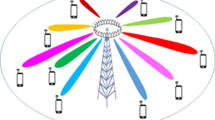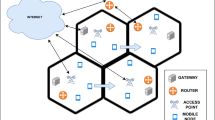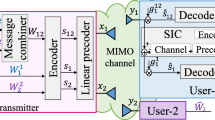Abstract
This work proposes a radio resource management framework employing game theoretic concepts for orthogonal frequency division multiple access, the most prevalent multiple access technique for the next generation wireless networks. The subcarrier allocation problem is encountered as a combinatorial auction, where the base station auctions the subcarriers and the users bid for and buy bundles of subcarriers, aiming at minimising their required transmit power. Subsequently, each allocated subcarrier is loaded with a number of bits, decided by each user independently, and the power control process is set up as a non-cooperative game. Each user responds to the interference sensed in his environment and, through a best responses process, the game converges to the unique, Pareto optimal, Nash equilibrium. In order to guarantee convergence, a limit is imposed to the maximum modulation level for each subcarrier. Simulation results show that the auction algorithm follows closely the performance of the optimal algorithm, whereas it is of lower computational complexity and requires less feedback information. Similarly, the proposed distributed bit loading and power control scheme achieves lower transmit power per offered bit rate unit. However, the distributed nature of the algorithm results in lower total offered bit rate, because of the partial knowledge and exploitation of channel state information.
Similar content being viewed by others
References
IEEE. (2009). IEEE standard for local and metropolitan area networks part 16: Air interface for broadband wireless access systems. IEEE Std 802.16-2009 (Revision of IEEE Std 802.16-2004).
3GPP. (2009). Evolved universal terrestrial radio access (E-UTRA); long term evolution (LTE) physical layer; general description. Technical Report 3GPP TS 36.201 V9.0.0.
Wong C. Y., Cheng R. S., Lataief K. B., Murch R. D. (1999) Multiuser OFDM with adaptive subcarrier, bit, and power allocation. IEEE Journal on Selected Areas in Communications 17(10): 1747–1758
Kivanc D., Li G., Liu H. (2003) Computationally efficient bandwidth allocation and power control for OFDMA. IEEE Transactions on Wireless Communications 2(6): 1150–1158
Kulkarni G., Adlakha S., Srivastava M. (2005) Subcarrier allocation and bit loading algorithms for OFDMA-based wireless networks. IEEE Transactions on Mobile Computing 4(6): 652–662
Sadr S., Anpalagan A., Raahemifar K. (2009) Radio resource allocation algorithms for the downlink of multiuser OFDM communication systems. IEEE Communications Surveys & Tutorials 11(3): 92–106
Altman E., Boulogne T., El-Azouzi R., Jimnez T., Wynter L. (2006) A survey on networking games in telecommunications. Computers & Operations Research 33(2): 286–311
Charilas D. E., Panagopoulos A. D. (2010) A survey on game theory applications in wireless networks. Computer Networks 54(18): 3421–3430
Felegyhazi, M., & Hubaux J. P. (2006). Game theory in wireless networks: A tutorial. Technical report LCA-REPORT-2006-002, Ecole Polytechnique Federale de Lausanne.
MacKenzie, A. B., & DaSilva, L. A. (2006). Game theory for wireless engineers (Synthesis lectures on communications). San Francisco Bay Area, CA: Morgan & Claypool Publishers.
Yang K., Prasad N., Wang X. (2009) An auction approach to resource allocation in uplink OFDMA systems. IEEE Transactions on Signal Processing 57(11): 4482–4496
Rodriguez, V., & Mathar, R. (2010). Simple decentralised market-oriented allocation of sub-channels and power for access-point to terminal multi-carrier communication. In 44th Annual conference on information sciences and systems, 2010 (CISS 2010), pp. 1–5.
Han, S. W., & Han, Y. (2007). A competitive fair subchannel allocation for OFDMA system using an auction algorithm. In IEEE 66th vehicular technology conference, 2007 (VTC 2007 Fall), pp. 1787–1791.
Oh, J., Han, S. W., & Han, Y. (2008). Efficient and fair subchannel allocation based on auction algorithm. In IEEE 19th international symposium on personal, indoor and mobile radio communications, 2008 (PIMRC 2008), pp. 1–5.
Gai, Y., Gong, P., Lv, J., & Wu, W. (2009). Auction-based radio resource allocation for OFDMA systems. In 5th international conference on wireless communications, networking and mobile computing, 2009 (WiCom 2009), pp. 1–4.
Kong, Z., Kwok, Y.-K., & Wang, J. (2009). Auction-based scheduling in non-cooperative multiuser OFDM systems. In IEEE 69th vehicular technology conference, 2009 (VTC Spring 2009), pp. 1–4.
Forde, T. K., & Doyle, L. E. (2008). A combinatorial clock auction for OFDMA-based cognitive wireless networks. In 3rd international symposium on wireless pervasive computing, 2008 (ISWPC 2008), pp. 329–333.
Pang J.-S., Scutari G., Facchinei F., Wang C. (2008) Distributed power allocation with rate constraints in gaussian parallel interference channels. IEEE Transactions on Information Theory 54(8): 3471–3489
Jorswieck, E., & Mochaourab, R. (2009). Power control game in protected and shared bands: Manipulability of Nash equilibrium. In International conference on game theory for networks, 2009 (GameNets 2009), pp. 428–437.
Su Y., van Der Schaar M. (2009) A new perspective on multi-user power control games in interference channels. IEEE Transactions on Wireless Communications 8(6): 2910–2919
Su Y., van der Schaar M. (2009) Conjectural equilibrium in multiuser power control games. IEEE Transactions on Signal Processing 57(9): 3638–3650
Cioffi, J. M. (1991). A multicarrier primer. ANSI T1E1, 4.
Fernekess A., Klein A., Wegmann B., Dietrich K. (2009) Modular system-level simulator concept for ofdma systems—[Modeling and simulation: A practical guide for network designers and developers]. IEEE Communications Magazine 47(3): 150–156
Li G., Liu H. (2005) On the optimality of the OFDMA network. IEEE Communications Letters 9(5): 438–440
Pietrzyk S. (2006) OFDMA for broadband wireless access. Artech House mobile communications series. Artech House, Boston, MA
Zander J. (1997) Radio resource management in future wireless networks: Requirements and limitations. IEEE Communications Magazine 35(8): 30–36
Stiakogiannakis, I. N., Zarbouti, D. A., Tsoulos, G. V., & Kaklamani, D. I. (2008). Subcarrier allocation algorithms for multicellular OFDMA snetworks without channel state information. In 3rd International symposium on wireless pervasive computing, 2008 (ISWPC 2008), pp. 73–77.
Zarbouti D., Stiakogiannakis I., Tsoulos G., Athanasiadou G., Kaklamani D. (2009) OFDMA techniques in multicellular networks with total frequency reuse. Computer Communications 32(3): 522–530
Kuhn H. W. (1955) The Hungarian method for the assignment problem. Naval Research Logistics Quarterly 2: 83–97
Munkres J. (1957) Algorithms for the assignment and transportation problems. Journal of the Society for Industrial and Applied Mathematics 5(1): 32–38
Burden R., Faires J. D. (1997) Numerical analysis, 6th Edn. Brooks/Cole Pub. Co, Pacific Grove, CA
Lehmann D., O’Callaghan L. I., Shoham Y. (2002) Truth revelation in approximately efficient combinatorial auctions. Journal of the ACM 49(5): 577–602
Krishna V. (2002) Auction theory. Academic Press, London
Viswanath P., Tse D. N. C., Laroia R. (2002) Opportunistic beamforming using dumb antennas. IEEE Transactions on Information Theory 48(6): 1277–1294
Pietrzyk, S., & Janssen, G. J. M. (2004). Radio resource allocation for cellular networks based on OFDMA with QoS guarantees. In IEEE global telecommunications conference, 2004 (GLOBECOM 2004), Vol. 4, pp. 2694–2699.
Stiakogiannakis, I. N., & Kaklamani, D. I. (2011). A combinatorial auction based subcarrier allocation algorithm for multiuser OFDMA. In IEEE 73rd vehicular technology conference, 2011 (VTC Spring 2011), pp. 1–5.
Fudenberg D., Tirole J. (1991) Game theory. MIT Press, Cambridge, MA
Osborne M. J. (2004) An introduction to game theory. Oxford University Press, New York
WiMAX Forum. (2008). WiMAX system evaluation methodology. Technical Report Version 2.1.
European Cooperation in Science and Technology. (1999). Digital mobile radio towards future generation systems. COST 231 Final Report.
ITU. (2006). Guidelines for evaluation of radio transmission technologies for IMT-2000. Technical Report Rec. ITU-R M.1225.
Chapin J. M., Lehr W. H. (2007) Cognitive radios for dynamic spectrum access—the path to market success for dynamic spectrum access technology. IEEE Communications Magazine 45(5): 96–103
Author information
Authors and Affiliations
Corresponding author
Additional information
Financial support by National Technical University of Athens under the program PEVE 2009, grand no 65177200, is gratefully acknowledged.
Rights and permissions
About this article
Cite this article
Stiakogiannakis, I.N., Kaklamani, D.I. A Radio Resource Management Framework for Multi-User Multi-Cell OFDMA Networks Based on Game Theory. Wireless Pers Commun 69, 745–770 (2013). https://doi.org/10.1007/s11277-012-0610-x
Published:
Issue Date:
DOI: https://doi.org/10.1007/s11277-012-0610-x




